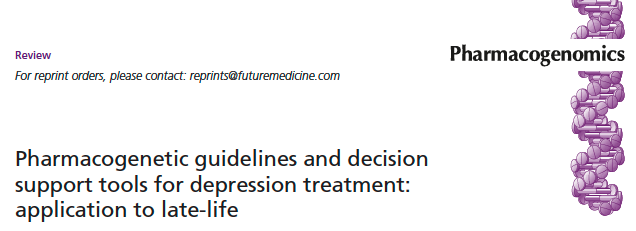Pharmacogenetic guidelines and decision support tools for depression treatment
Application to late-life

Late-life depression (LLD) is a major depressive disorder that affects someone after the age of 60 years.
LLD is frequently associated with inadequate response and remission from antidepressants, in addition to polypharmacy. Pharmacogenetics offers a promising approach to improve clinical outcomes in LLD via new discoveries determining the genetic basis of response rates and side effects, as well as the development of tailored pharmacogenetic-based decision support tools. This invited review evaluates the LLD pharmacogenetic evidence base and the extent to which this was incorporated into existing commercial decision support tools and clinical pharmacogenetic guidelines.
Executive Summary
Unique clinical scenario of late-life depression
- The clinical scenario of late-life depression (LLD) is often different to major depressive disorder (MDD) presenting in adults. It is characterized by more co-morbidities and cognitive impairment, polypharmacy, greater adverse drug events, decreased functional status, and risk of suicide.
The unique phenotype of LLD is instructive for novel therapeutic development
- The pathophysiology of LLD is unique to MDD presenting in adults in various ways, including due to amyloid and tau protein aggregation, increased white matter hyperintensities and damage to tracts and circuits causing disconnection of brain regions. This is an important consideration in pharmacogenetic research.
- The aging process is accompanied by a decline in the function of numerous organs and systems, affecting pharmacokinetic processes (e.g., absorption, distribution, metabolism, and excretion) to different extents and making more variable the interindividual response to medications. Therefore, such phenotypic factors should be incorporated into pharmacogenetic decision support tools (DSTs).
- There are presumably a number of pharmacodynamic changes that occur in late-life and are pertinent to the use of psychotropic medications; however, this is a significantly understudied area.
Antidepressant pharmacogenetic studies in LLD
- Current discovery efforts have mainly focused on elucidating the pharmacodynamics and pharmacokinetics of genetic loci implicated in LLD such as SLC6A4, DAT1, ABCB1, and BDNF.
Clinical pharmacogenetic guidelines for antidepressants
- CYP2D6 metabolizes most antidepressants and is not influenced by age, but it is susceptible to phenoconversion in patients taking multiple medications. CYP2C19, however, is responsible for demethylating tricyclic antidepressants into their active form and has been shown to have decreased enzymatic activity with age, suggesting CYP2C19 dosing guidelines should account for age-related changes.
Efficacy of pharmacogenetic-based DSTs in MDD presenting in adults & LLD
- Pharmacogenetic-based DSTs are designed to help clinicians select medications that will optimize treatment efficacy based on a patient’s genotype.
- Efficacy studies of pharmacogenetic-based DSTs in depression have focused on their use primarily in MDD presenting in adults and as such, there has been a paucity of studies focused on depression in older adults.
Cost-effectiveness of pharmacogenetic-based DSTs in LLD
- There are early promising data from two studies examining the cost-effectiveness of pharmacogenetic-based DSTs in LLD.
Conclusion & future perspectives
- Pharmacogenetic-based guidelines and tools are relevant to the treatment of LLD, but the evidence supporting their use in treating LLD is limited.
- More discovery-based research is required and evaluations of existing pharmacogenetic-based DSTs in LLD settings are warranted in order to bring pharmacogenetic evidence in LLD into alignment with MDD presenting in adults.
- Unique factors relevant to LLD need to be considered in the development of pharmacogenentic-based DSTs for LLD, including pathophysiological factors, phenotypic factors relevant to pharmacokinetics, diverse ethnicities and factors such as suicidal ideation.
White Paper
Donald D Chang, Harris A Eyreeuro, Ryan Abbott, Michael Coudreaut, Bernhard T Baune, Jeffrey A Shaman, Helen Lavretsky, Eric J Lenze, David A Merrill, Ajeet B Singh, Benoit H Mulsant, Charles F Reynolds III, Daniel J Muller, and Chad Bousman
*Author for correspondence: harris.eyre@gmail.com
